
Introduction
This is by no means a complete list but it includes most of the common knots in use and a few you may not have come across before.
| A | B | C | D | E | F | G | H | I | J | K | L | M | N | O | P | Q | R | S | T | U | V | W | X | Y | Z |
Magnus Hitch
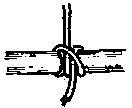 There is much confusion between the Magnus Hitch and the Rolling Hitch and some authorities consider them to be the same knot. It is sometimes accepted that the Magnus Hitch is the form used on spars while the Rolling Hitch is the form used for hitching one rope to another - generally a smaller one to a larger. In both forms the strain can be taken at an acute angle.
There is much confusion between the Magnus Hitch and the Rolling Hitch and some authorities consider them to be the same knot. It is sometimes accepted that the Magnus Hitch is the form used on spars while the Rolling Hitch is the form used for hitching one rope to another - generally a smaller one to a larger. In both forms the strain can be taken at an acute angle.
Man Harness Knot
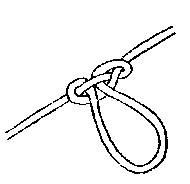 Also called the Artillery Knot. A loop knot tied in the bight through which an arm can be put up to the shoulder to assist in hauling, while leaving the hands free. Formerly used on gun carriages, one end of the rope being fastenend to a ring on the end of the axle.
Also called the Artillery Knot. A loop knot tied in the bight through which an arm can be put up to the shoulder to assist in hauling, while leaving the hands free. Formerly used on gun carriages, one end of the rope being fastenend to a ring on the end of the axle.
Man Rope Knot
 A multi-strand knot in the end of a rope consisting of a Double Wall and Double Crown. Tied in the end of manropes and sideropes to provide a hand hold. It was properly made in four-strand rope and was often canvas covered.
A multi-strand knot in the end of a rope consisting of a Double Wall and Double Crown. Tied in the end of manropes and sideropes to provide a hand hold. It was properly made in four-strand rope and was often canvas covered.
Marlingspike
Definition: A metal tool with a knobbed head and tapering to a point. Used for tightening seizing, etc., and for opening strands when splicing. The knobbed end is used for pounding.
Marlingspike Hitch
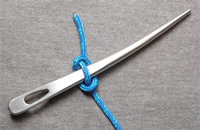 A temporay hitch made with a Marlingspike, or a tent peg, etc., when extra strain is needed to heave a small rope taut, as, for example, the turns of lashings or seizings. Also used on occasion in Sheepshanks or Harvester's Hitch.
A temporay hitch made with a Marlingspike, or a tent peg, etc., when extra strain is needed to heave a small rope taut, as, for example, the turns of lashings or seizings. Also used on occasion in Sheepshanks or Harvester's Hitch.
This file is licensed under the Creative Commons Attribution ShareAlike 2.5 License
Matthew Walker
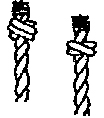 Matthew Walker and Double Matthew Walker -Probably the best and most useful of the multi- strand rope end knots. It is claimed that the unknown Matthew Walker is the only man to have a knot named after him.
Matthew Walker and Double Matthew Walker -Probably the best and most useful of the multi- strand rope end knots. It is claimed that the unknown Matthew Walker is the only man to have a knot named after him.
Middleman's Knot
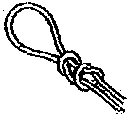 Also called the Englishman's Loop (in America) the Fisherman's or Angler's Loop, and it is one of the several knots known as True Lover's Knot. It is a useful loop knot tied in the bight by one of at least four different methods. Once much used for the middleman on a rope in climbing, but now superseded for this purpose by better knots such as the Alpine Butterfly.
Also called the Englishman's Loop (in America) the Fisherman's or Angler's Loop, and it is one of the several knots known as True Lover's Knot. It is a useful loop knot tied in the bight by one of at least four different methods. Once much used for the middleman on a rope in climbing, but now superseded for this purpose by better knots such as the Alpine Butterfly.
Midshipman's Hitch
 An excellent hitch that can be temporarily or permanently made. When used to make a loop, it can be slid to adjust the loop for size. A good knot to know if you have fallen in the sea and a rope is tossed to you. Also useful as a Guyline Hitch or to substitute for a broken slider on a guyline. It is identical in form to the Rolling Hitch.
An excellent hitch that can be temporarily or permanently made. When used to make a loop, it can be slid to adjust the loop for size. A good knot to know if you have fallen in the sea and a rope is tossed to you. Also useful as a Guyline Hitch or to substitute for a broken slider on a guyline. It is identical in form to the Rolling Hitch.
Monkey's Fist
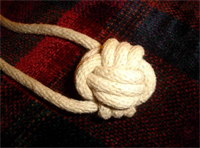 A knob knot at the end of a rope, usually made round a pebble or ball of lead, etc. It is the best heaving line knot, the heavy core in the knot giving it the weight to carry the mass of the line when thrown.
A knob knot at the end of a rope, usually made round a pebble or ball of lead, etc. It is the best heaving line knot, the heavy core in the knot giving it the weight to carry the mass of the line when thrown.
Permission is granted to copy, distribute and/or modify this document under the terms of the GNU Free Documentation license,
Mousing a Hook
 If an appreciable load is to be on a block the hook should be 'moused'. This strengthens the hook and at the same time prevents the rope from jumping out. A 'mouse' is also raised on a particular rope to prevent anything slipping off: in this case the diameter of the rope at the particular place is increased by building up with turns and riding turns.
If an appreciable load is to be on a block the hook should be 'moused'. This strengthens the hook and at the same time prevents the rope from jumping out. A 'mouse' is also raised on a particular rope to prevent anything slipping off: in this case the diameter of the rope at the particular place is increased by building up with turns and riding turns.
Noose
Definition: A loop which is made with the end round its own standing part in such a way that it draws tight when hauled upon. Often erroneously callled a slip knot.
Simple Noose
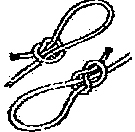 The Simple Noose or Noose Knot is simply an Overhand Knot but with the final tuck made with a bight instead of an end.. A Noose made with a base of the Figure-of- Eight Knot is to be preferred. See also the Running Bowline.
The Simple Noose or Noose Knot is simply an Overhand Knot but with the final tuck made with a bight instead of an end.. A Noose made with a base of the Figure-of- Eight Knot is to be preferred. See also the Running Bowline.
| A | B | C | D | E | F | G | H | I | J | K | L | M | N | O | P | Q | R | S | T | U | V | W | X | Y | Z |
